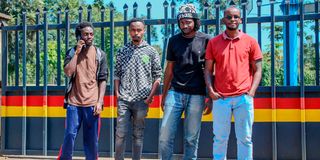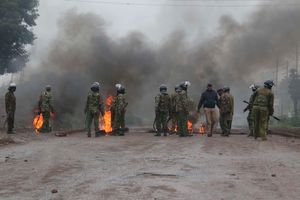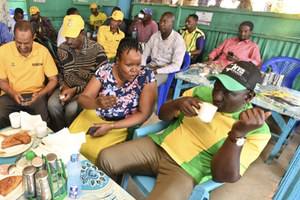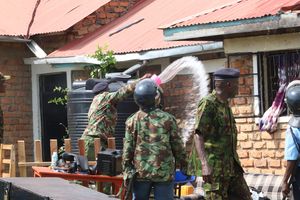
From left: Filmmakers linked to BBC Blood Parliament documentary Nicholas Wambugu Gichuki, Chris Wamae, Brian Adagala and MarkDenver Karubiu at Muthaiga Police Station in Nairobi after being released from custody on May 3, 2025.
Sometime in the course of this week, let us find a date and time when public and private spaces in the republic, and beyond, will simultaneously tune into the BBC’s “Blood Parliament”. That would be the best way to send a powerful message to the government of President William Ruto and his clueless officials that this country can never go back to the dark ages.
On Saturday morning, May 3, we woke up on the World Press Freedom Day, only to be hit by disturbing news of the arrest of four independent journalists/film makers, reportedly on suspicion that they were involved with the making of the BBC documentary.
The outstanding piece of forensic journalism unmasked some of the Kenyan police officers and soldiers responsible for deliberate execution of unarmed protesters during the Gen Z storming of Parliament on June 25 last year, the high point of protests against “Zakayonomics”.
The four freelancers—Brian Adagala, Chris Wamae, Mark Karubui and Nick Wambugu—were released not long afterwards following public outrage. They were set free awaiting unspecified charges, but the line of interrogation indicated police were looking into the area of spreading false information, probably in relation to the BBC production.
They were yet to appear in court as I pen this. Probability is that the authorities will take the four to court on trumped-up charges.
The BBC has already clarified that the four were not involved in the production. Some in the media fraternity have wondered if the corporation is disowning its local stringers, but it is instructive that the extended line of credits comes with the revelation that some of those who contributed to the shooting cannot be named for their own security.
Whether the four were involved in the production or not does not negate the fact that the arrests demonstrated, once again, how the Kenya Kwanza regime is allergic to the truth and all efforts to hold it up to public scrutiny.
The world is witness to increasing numbers of abductions, assaults, arrests, threats and other outrages against media freedom and other constitutional rights around freedom of speech, assembly, opinion, expression and so on.
The BBC documentary was a masterpiece. As we say in our part of the world, the production team did the Lord’s Work.
Mass screening
And that is why we must all stand and acknowledge that fact, and defy the government’s oppressive efforts with a show of solidarity in mass screening of the documentary.
The arrest of the four young men was not the only example of the extent to which the State security machinery was being used in futile and foolish efforts to suppress the dissemination of “Blood Parliament”.
We all witnessed how a few days prior, parliamentarians took time out from important legislative business to go into orchestrated diatribes against the BBC. The performance was reminiscent of the dark days of the one-party dictatorship when politicians regularly fell over each other’s feet in furious competition to catch the eye of the president with the most outrageous, extreme, vulgar and loudest condemnation and threats against those who strayed from the straight and narrow path.
On Monday last week, the BBC succumbed to government pressure and cancelled a planned private screening and panel discussion on “Blood Parliament” at a venue in Nairobi.
According to reliable sources, a government administrative functionary cited spurious security grounds for cancelling the screening. Owners of the venue at Nairobi’s Yaya Centre were also pressured by the State security machinery, and queried by regulatory authorities on communications as to whether they had sought licences to host such screenings.
No such permissions are required under Kenyan law. That would be akin to demanding that pubs and clubs that patrons flock to watch major sporting events secure licences for public screening.
It is also emerging that a few days before arrest of the four young men, security operatives in unmarked cars scouted the office block in Karen hosting the BBC office. They pretended to be businessmen looking to rent office space, but made enquiries that revealed their interest. Some BBC staffers in Nairobi were also subjected to strange telephone calls on what seemed like intimidation, most likely directed by the National Intelligence Service.
This is the bureaucratic and “Deep State” security abuse of power that must be resisted at all costs. An apt show of defiance would be for media houses, media representative bodies, civil society, human rights defenders, religious organisations and others to come together for simultaneous public screening of “Blood Parliament” at multiple locations.
[email protected]; @MachariaGaitho










